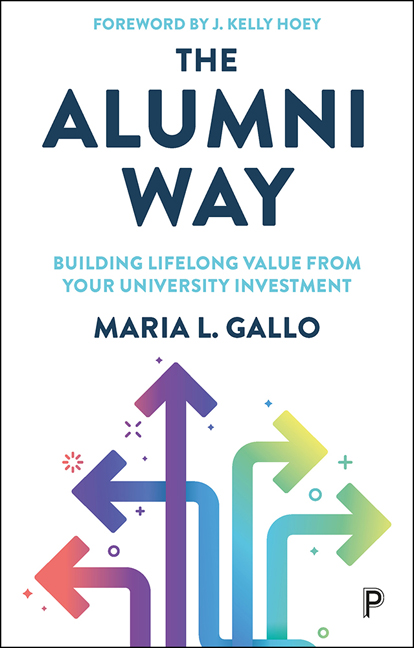Book contents
- Frontmatter
- Dedication
- Contents
- Acknowledgements
- Foreword
- Introduction: We are all alumni
- PART I Charting the course of the Alumni Way
- PART II The Alumni Way trait: Reflection
- PART III The Alumni Way trait: Curiosity
- PART IV The Alumni Way trait: Passion
- PART V The Alumni Way trait: Generosity
- PART VI Alumni: Bringing it into our lives
- Notes
- References
- About the author
- Index
15 - Passion trait summary: Our lives, our alma mater
Published online by Cambridge University Press: 13 May 2022
- Frontmatter
- Dedication
- Contents
- Acknowledgements
- Foreword
- Introduction: We are all alumni
- PART I Charting the course of the Alumni Way
- PART II The Alumni Way trait: Reflection
- PART III The Alumni Way trait: Curiosity
- PART IV The Alumni Way trait: Passion
- PART V The Alumni Way trait: Generosity
- PART VI Alumni: Bringing it into our lives
- Notes
- References
- About the author
- Index
Summary
Our universities are often viewed as and rated on their instrumental purposes, such as graduate employability. This section reminds us that our institutions also have a greater purpose: as higher education and philosophy scholar Mala Singh succinctly states, ‘higher education itself as a public good and higher education for the public good’. Yes, our alma mater is a valuable part of our educational community. As alumni, we are an important part of this public good within the university ecosystem. As alumni who wish to pursue a passion – whether it is recreation, social justice activism, travel, and beyond – the university can help us pursue our passion to its fullest.
We need to be open to the alumni dimension of our lives to support our passions. Our alma mater, fellow alumni, even a favourite professor, may support us in identifying and fostering our passions. They sustain us or also prove to be obsessive or challenging aspects of our lives. Carol Dweck reminds us that passion is also an important trait of resilience: ‘The passion for stretching yourself and sticking to it’, she says, ‘even (or especially) when it's not going well, is the hallmark of the growth mindset’. When we try something new, venture somewhere novel, or get involved in something that hasn't gone entirely as we hoped, we can draw on our passion for our own tenacity to try it until it works – allowing us to build our passionate arsenal.
In her book The Rocket Years: How Your Twenties Launch the Rest of Your Life, Elizabeth Segran argues that it is in our 20s that we often develop our lifelong hobbies. It may seem counterintuitive, as our time in university or immediately after graduation for many of us was a time to focus on our career. ‘We sometimes seek out hobbies that reflect our values and our sense of self,’ Segran says. ‘But we occasionally stumble into hobbies entirely by chance and discover a new passion … The hobbies we settle on, as random as they are, end up defining us.’ Whether we develop a passion for photography, sewing, or windsurfing this can add another dimension to our lives.
- Type
- Chapter
- Information
- The Alumni WayBuilding Lifelong Value from your University Investment, pp. 131 - 134Publisher: Bristol University PressPrint publication year: 2021

